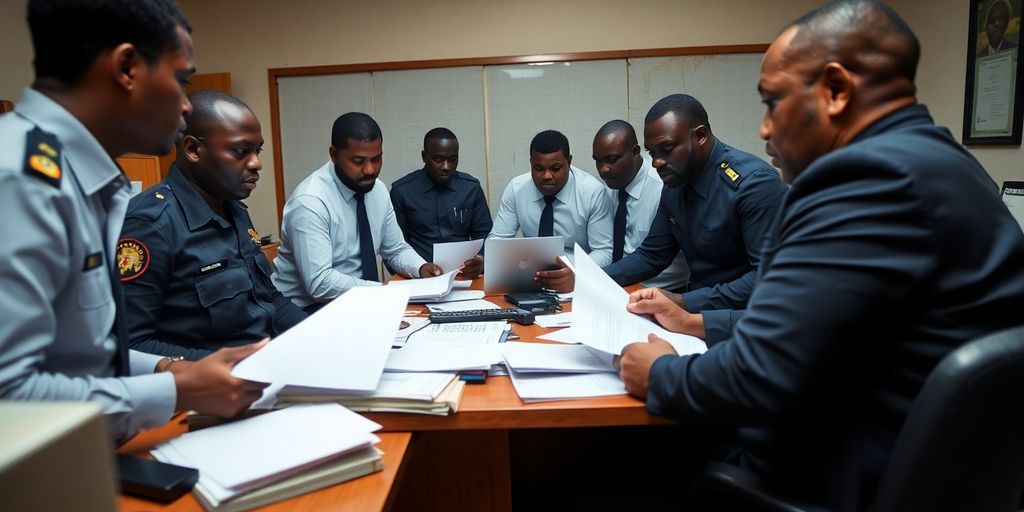In a significant move to tackle financial crime, Interpol has launched a major operation targeting online fraud networks in West Africa. This operation, known as Operation Jackal III, has led to the arrest of numerous suspects and the seizure of millions in illegal assets. The crackdown highlights the growing threat posed by organized crime groups in the region and the importance of international cooperation in combating these crimes.
Key Takeaways
- Interpol’s Operation Jackal III resulted in 300 arrests across 21 countries.
- Over $3 million in illegal assets were seized during the operation.
- The operation targeted major crime syndicates like Black Axe involved in online fraud.
- International collaboration is essential to effectively combat financial crime.
- The crackdown aims to reduce the influence of West African crime groups globally.
Interpol Announces Major Crackdown on West African Financial Fraud
Overview of Operation Jackal III
In a significant move against financial crime, Interpol has arrested 300 individuals linked to West African crime groups. This operation, known as Operation Jackal III, took place from April 10 to July 3, 2024, across 21 countries. The operation aimed to combat online financial fraud, which has been on the rise, particularly from syndicates like Black Axe.
Key Arrests and Seizures
During this operation, law enforcement agencies seized approximately $3 million in illegal assets and blocked over 720 bank accounts. The arrests included suspects from various countries, highlighting the global nature of this crime. Here’s a brief overview of the key outcomes:
- 300 arrests made
- $3 million in assets seized
- 720 bank accounts blocked
Impact on Global Financial Crime
The results of Operation Jackal III underscore the urgent need for international cooperation in tackling financial fraud. As stated by Isaac Oginni, director of Interpol’s Financial Crime and Anti-Corruption Centre, the volume of fraud originating from West Africa is alarming. This operation not only disrupts criminal networks but also helps protect communities worldwide from the impacts of financial crime.
The fight against financial fraud requires a united front from law enforcement agencies globally.
Through these efforts, we are making strides in reducing the influence of organized crime and safeguarding the financial systems that are vital to our economies.
The Role of Interpol in Combating Financial Fraud

International Collaboration Efforts
In our fight against financial fraud, international collaboration is essential. Interpol connects police forces from different countries, allowing them to share vital information and intelligence. This cooperation is crucial because fraud often crosses borders, making it difficult for any single nation to tackle the problem alone. For instance, during Operation Jackal III, countries like Nigeria, Argentina, and the United States worked together to disrupt criminal networks.
Technological Tools and Strategies
We have also embraced advanced technology to combat financial crime. Interpol utilizes various tools, such as the Anti-Money Laundering Rapid Response Protocol (ARRP), which helps member countries quickly intercept illegal funds. This protocol is a game-changer, allowing us to act swiftly against fraudsters. Additionally, we leverage partnerships with private sector companies to enhance our capabilities in tracking and analyzing financial crimes.
Success Stories from Recent Operations
Our recent operations have yielded significant results. For example, in Operation Jackal III, we achieved:
- 75 arrests of key suspects involved in financial fraud.
- EUR 1.2 million intercepted from bank accounts linked to fraudulent activities.
- 49 property searches that uncovered evidence of criminal operations.
These successes demonstrate the effectiveness of our strategies and the importance of working together to combat financial fraud on a global scale.
By following illegal money trails worldwide, we ensure that no matter where these criminals try to hide, they will be relentlessly pursued and brought to justice.
In conclusion, Interpol plays a vital role in combating financial fraud through international collaboration, technological advancements, and successful operations. We remain committed to disrupting criminal activities and protecting communities from the devastating effects of financial crime.
Understanding the West African Crime Syndicates
Profile of Black Axe and Other Groups
In our exploration of West African crime syndicates, we find that Black Axe stands out as one of the most notorious groups. This organization is involved in various illegal activities, including:
- Cyber fraud
- Human trafficking
- Drug smuggling
- Violent crimes
These activities not only affect local communities but also have a global impact, making it essential for international law enforcement to take action.
Criminal Activities and Tactics
The tactics employed by these syndicates are diverse and often sophisticated. They include:
- Advance-fee fraud: Victims are tricked into paying fees for non-existent services or products.
- Money laundering: Using various methods to disguise the origins of illegally obtained money.
- Online scams: Exploiting the internet to deceive individuals and businesses.
These methods highlight the need for vigilance and collaboration among law enforcement agencies worldwide.
Global Reach and Influence
The influence of West African crime syndicates extends far beyond their home countries. They have established networks across multiple continents, which allows them to:
- Operate in various jurisdictions
- Evade law enforcement efforts
- Exploit weaknesses in international financial systems
This global reach underscores the importance of coordinated efforts to combat these criminal organizations.
The fight against financial fraud requires a united front. By working together, we can dismantle these networks and protect communities worldwide.
In conclusion, understanding the structure and operations of these crime syndicates is crucial for developing effective strategies to combat their influence and protect potential victims.
Operation Jackal III: A Detailed Look
Timeline and Execution
Operation Jackal III was a significant global effort that took place over several months, culminating in a coordinated action week from September 26 to September 30. During this period, law enforcement agencies from 14 countries worked together to target the Black Axe crime syndicate and its affiliates. This operation marked a pivotal moment in the fight against financial fraud, showcasing the power of international collaboration.
Countries Involved and Their Contributions
The operation saw participation from various countries, each contributing unique resources and intelligence. Here’s a brief overview of the countries involved:
| Country | Contribution |
|---|---|
| Argentina | Dismantled a major Nigerian-led network |
| Switzerland | Seized drugs and cash, arrested suspects |
| Portugal | Disrupted money mule recruitment networks |
| South Africa | Arrested key suspects linked to scams |
| United States | Provided intelligence and operational support |
Challenges Faced During the Operation
Despite the success of Operation Jackal III, several challenges emerged:
- Coordination Across Borders: Ensuring effective communication among different countries was crucial yet complex.
- Legal Barriers: Varying laws and regulations made it difficult to execute certain operations.
- Resource Allocation: Balancing resources among participating nations required careful planning and negotiation.
The success of Operation Jackal III demonstrates that when countries unite against a common threat, they can achieve remarkable results in combating financial crime.
The Aftermath of the Crackdown

Legal Proceedings and Trials
In the wake of Operation Jackal III, we have seen a significant number of legal actions initiated against those involved in financial fraud. A total of 1,006 arrests were made, and many of these individuals are now facing serious charges. The legal process is expected to be lengthy, as authorities work to build strong cases against the suspects.
Asset Recovery and Redistribution
The operation also led to the recovery of substantial assets. Here are some key figures:
- EUR 1.2 million intercepted in bank accounts
- 75 arrests made
- 49 property searches conducted
- 7 INTERPOL Purple Notices issued
- 6 INTERPOL Red Notices for wanted fugitives
This recovery is crucial, as it allows for the redistribution of funds to victims and helps to disrupt the financial networks of these crime syndicates.
Future Monitoring and Prevention Strategies
As we move forward, it is essential to implement effective monitoring and prevention strategies. Some of the steps we can take include:
- Enhancing international cooperation among law enforcement agencies.
- Utilizing advanced technology to track financial transactions.
- Increasing public awareness about financial fraud and scams.
The fight against financial fraud is ongoing, and we must remain vigilant to protect our communities from these threats.
In conclusion, the aftermath of Operation Jackal III has set a strong foundation for future efforts against financial crime. We are committed to continuing this fight and ensuring that justice is served for the victims of these crimes.
The Human Impact of Financial Fraud
Stories from Victims
Financial fraud can devastate lives. We have heard countless stories from victims who have lost their savings, homes, and even their sense of security. The emotional toll is often as significant as the financial loss. Many victims report feelings of shame and isolation, making it difficult for them to seek help or share their experiences.
Community Reactions and Support
In response to the rising tide of financial fraud, communities are coming together to support victims. Local organizations are offering resources such as:
- Counseling services to help victims cope with emotional distress.
- Financial literacy programs to educate the public on recognizing and avoiding scams.
- Support groups where victims can share their experiences and find solidarity.
Long-term Consequences for Affected Regions
The impact of financial fraud extends beyond individual victims. Regions affected by these crimes often face:
- Economic decline as trust in local businesses diminishes.
- Increased crime rates as fraudsters may resort to other criminal activities.
- Strain on law enforcement as they work to combat these sophisticated networks.
The research findings revealed that fraud and related financial crime has a significant effect on the Nigerian economy while fraud and financial crime have no…
Technological Advancements in Fighting Financial Crime

Use of AI and Machine Learning
In our fight against financial crime, we have increasingly turned to artificial intelligence (AI) and machine learning. These technologies help us analyze vast amounts of data quickly, allowing us to identify suspicious patterns and behaviors that might indicate fraud. For instance, AI can:
- Detect anomalies in transaction data.
- Predict potential fraud before it occurs.
- Automate the reporting process for suspicious activities.
Cybersecurity Measures Implemented
To protect sensitive information, we have implemented robust cybersecurity measures. These include:
- Multi-factor authentication for all financial transactions.
- Regular security audits to identify vulnerabilities.
- Training programs for employees to recognize phishing attempts and other scams.
Future Innovations on the Horizon
Looking ahead, we are excited about the potential of new technologies. Some innovations we anticipate include:
- Enhanced blockchain technology for secure transactions.
- Advanced data analytics tools for real-time monitoring.
- Collaborative platforms for sharing intelligence across borders.
As we embrace digital transformation, we recognize that technology is a crucial ally in our ongoing battle against financial fraud. By leveraging these advancements, we can build a more resilient system to protect our communities from financial crime.
Lessons Learned from Operation Jackal III
Strengths and Weaknesses of the Operation
In reflecting on Operation Jackal III, we recognize several key strengths and weaknesses that emerged during this significant initiative:
- Strengths:
- Weaknesses:
Feedback from Law Enforcement Agencies
Law enforcement agencies involved in the operation provided valuable feedback:
- Increased Awareness: Many agencies noted a heightened awareness of the global nature of financial fraud.
- Need for Training: There is a strong demand for ongoing training in cybercrime investigation techniques.
- Future Collaborations: Agencies expressed interest in more frequent joint operations to tackle transnational crime.
Recommendations for Future Operations
To enhance the effectiveness of future operations, we suggest the following:
- Strengthen International Partnerships: Building stronger ties with more countries can improve intelligence sharing and operational success.
- Invest in Technology: Utilizing advanced technologies like AI can help in tracking and analyzing financial crimes more efficiently.
- Focus on Community Engagement: Raising public awareness about financial fraud can empower communities to report suspicious activities.
By learning from our experiences in Operation Jackal III, we can better prepare for future challenges in combating financial crime and protect communities worldwide.
The Global Implications of Interpol’s Actions

Influence on International Law Enforcement Policies
As we reflect on the recent actions taken by Interpol, it is clear that these efforts have significant implications for international law enforcement policies. The crackdown on financial fraud in West Africa not only disrupts local crime syndicates but also sets a precedent for global cooperation in tackling financial crimes. By sharing intelligence and resources, countries can better combat the transnational nature of these crimes.
Impact on Global Crime Networks
The operations led by Interpol, such as Operation Jackal III, have shown a marked impact on global crime networks. The arrests of key figures in these syndicates, including eight cybercriminals linked to phishing scams, demonstrate how coordinated efforts can dismantle complex criminal organizations. This operation has highlighted the need for ongoing collaboration among nations to address the evolving tactics of financial fraudsters.
Future Collaborations and Initiatives
Looking ahead, we can anticipate several key initiatives that will emerge from this crackdown:
- Enhanced training programs for law enforcement agencies to recognize and respond to financial fraud.
- Increased funding for technological tools that aid in tracking illicit financial flows.
- Stronger partnerships between Interpol and private sector organizations to share information and resources.
The fight against financial fraud is a continuous battle that requires vigilance and cooperation from all nations.
In conclusion, the global implications of Interpol’s actions extend far beyond immediate arrests and seizures. They pave the way for a more unified approach to combating financial crime on an international scale, ensuring that we remain one step ahead of those who seek to exploit vulnerabilities for their gain.
Public Awareness and Education on Financial Fraud
Importance of Public Vigilance
In our fight against financial fraud, public awareness is crucial. Many individuals remain unaware of the tactics used by scammers, making them easy targets. By educating ourselves and others, we can significantly reduce the risk of falling victim to these crimes. Here are some key points to consider:
- Understanding common scams, such as phishing and romance fraud.
- Recognizing the signs of fraudulent activities.
- Knowing how to report suspicious behavior.
Educational Campaigns and Resources
We believe that effective educational campaigns can empower communities. Various organizations are working to provide resources that help people stay informed. Some of these resources include:
- Workshops and seminars on cybersecurity practices.
- Online courses that cover financial literacy and fraud prevention.
- Informational pamphlets distributed in local communities.
Role of Media in Spreading Awareness
The media plays a vital role in raising awareness about financial fraud. By reporting on recent scams and sharing stories of victims, they help inform the public. This can lead to:
- Increased vigilance among potential victims.
- Greater community support for those affected by fraud.
- A collective effort to combat financial crime.
In addressing the alarming surge in financial fraud in Nigeria, we must recognize that a lack of public awareness about basic cybersecurity practices makes customers vulnerable to scams like phishing.
By working together, we can create a safer environment and protect ourselves from financial fraud.
Conclusion
In conclusion, the recent crackdown by Interpol on financial fraud in West Africa marks a significant step in the fight against organized crime. With 300 arrests and the seizure of millions in illegal assets, this operation highlights the importance of global cooperation in tackling these crimes. As cybercriminals become more sophisticated, it is crucial for law enforcement agencies worldwide to work together to protect communities from the devastating effects of financial fraud. The success of Operation Jackal III serves as a reminder that, through collaboration and determination, we can make a difference in the ongoing battle against financial crime.
Frequently Asked Questions
What is Operation Jackal III?
Operation Jackal III is a global effort led by Interpol to fight financial fraud linked to West African crime groups. It took place from April 10 to July 3, 2024, and involved police from 21 countries.
How many people were arrested during this operation?
During Operation Jackal III, around 300 individuals were arrested for their involvement in online financial fraud.
What types of crimes are West African crime groups involved in?
West African crime groups, like Black Axe, are involved in various illegal activities, including cyber fraud, drug smuggling, human trafficking, and violent crimes.
What were the results of the operation?
The operation led to the seizure of approximately $3 million in illegal assets and the freezing of over 720 bank accounts.
Why is financial fraud from West Africa a concern?
Financial fraud from West Africa is a growing problem, causing significant losses worldwide. It highlights the need for countries to work together to combat these criminal networks.
How does Interpol help in fighting financial crime?
Interpol assists by coordinating international operations, sharing intelligence, and providing resources to local law enforcement agencies to tackle financial crime.
What can individuals do to protect themselves from financial fraud?
People can protect themselves by being cautious with personal information, verifying the legitimacy of online transactions, and staying informed about common scams.
What is the future of international cooperation against financial crime?
International cooperation is expected to grow, with more countries joining forces to combat financial crime and sharing resources and intelligence to improve effectiveness.





